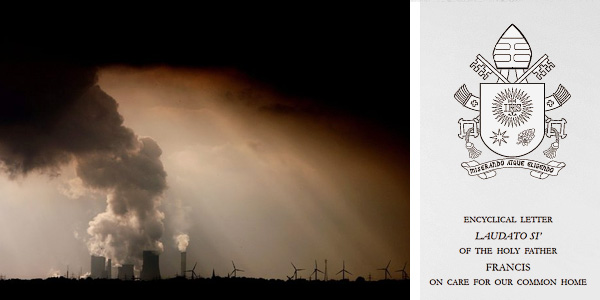Pave Francis’ encyklika: Laudato Si
18. juni 2015I dag udsendte Pave Francis sin længe varslede encyklika, Laudato Si’ [Lovet være du] om varetagelsen af vores fælles hjem, Jorden. Det er en tekst, som allerede inden udsendelsen har vakt store opmærksomhed, fra store forventninger om tekstens gennemslagskraft overfor kloden 1,2 mia. katolikker til stor irritation og afvisning først og fremmest fra USAs fremtrædende klimafornægtere, hvoraf mange er katolikker, og som med fremkomsten af denne tekst klart er på kant med deres religiøse basis.
Herunder kan man i første omgang se encyklikaen i sin helhed. Den kan ses i andre sprog her, og i pdf-format her. I blog-indlægget Pave Francis ind i klimakampen II kan man læse om de mange forventninger forud, og jeg regner med i de kommende dage at samle en række af de vigtigste passager om Laudato Si’s klima- og bæredygtighedsperspektiv og varetagelsen af vores fælles livsgrundlag i et særskilt blog-indlæg.
Tiden får vise det, men her få måneder før vedtagelsen af den første globale klimaaftale tegner Laudato Si’ til at kunne blive en milepæl i udviklingen af en ny fælles global bevidsthed om nødvendigheden af at alle bidrager til varetagelsen af vores fælles hjem, Jorden. Laudato Si’ – Lovet være du.
ENCYCLICAL LETTER
LAUDATO SI’
OF THE HOLY FATHER FRANCIS
ON CARE FOR OUR COMMON HOME
Laudato si’ (24 May 2015)
1. “LAUDATO SI’, mi’ Signore” – “Praise be to you, my Lord”. In the words of this beautiful canticle, Saint Francis of Assisi reminds us that our common home is like a sister with whom we share our life and a beautiful mother who opens her arms to embrace us. “Praise be to you, my Lord, through our Sister, Mother Earth, who sustains and governs us, and who produces various fruit with coloured flowers and herbs”.[1]
2. This sister now cries out to us because of the harm we have inflicted on her by our irresponsible use and abuse of the goods with which God has endowed her. We have come to see ourselves as her lords and masters, entitled to plunder her at will. The violence present in our hearts, wounded by sin, is also reflected in the symptoms of sickness evident in the soil, in the water, in the air and in all forms of life. This is why the earth herself, burdened and laid waste, is among the most abandoned and maltreated of our poor; she “groans in travail” (Rom 8:22). We have forgotten that we ourselves are dust of the earth (cf. Gen 2:7); our very bodies are made up of her elements, we breathe her air and we receive life and refreshment from her waters.
Nothing in this world is indifferent to us
3. More than fifty years ago, with the world teetering on the brink of nuclear crisis, Pope Saint John XXIII wrote an Encyclical which not only rejected war but offered a proposal for peace. He addressed his message Pacem in Terris to the entire “Catholic world” and indeed “to all men and women of good will”. Now, faced as we are with global environmental deterioration, I wish to address every person living on this planet. In my Apostolic Exhortation Evangelii Gaudium, I wrote to all the members of the Church with the aim of encouraging ongoing missionary renewal. In this Encyclical, I would like to enter into dialogue with all people about our common home.
4. In 1971, eight years after Pacem in Terris, Blessed Pope Paul VI referred to the ecological concern as “a tragic consequence” of unchecked human activity: “Due to an ill-considered exploitation of nature, humanity runs the risk of destroying it and becoming in turn a victim of this degradation”.[2] He spoke in similar terms to the Food and Agriculture Organization of the United Nations about the potential for an “ecological catastrophe under the effective explosion of industrial civilization”, and stressed “the urgent need for a radical change in the conduct of humanity”, inasmuch as “the most extraordinary scientific advances, the most amazing technical abilities, the most astonishing economic growth, unless they are accompanied by authentic social and moral progress, will definitively turn against man”.[3]


 rafen herover stammer fra Berlingske Barometer, som igennem hele valgkampen har sammenregnet et gennemsnit for de seneste målinger, og det man ser herover angiver billedet af situationen dagen før valgdagen. Den venstre søjle for hvert parti giver øjebliksbilledet pr. 17. juni 2015, mens den lysere højre søjle viser valgresultatet i 2011. Her har blå blok 50,5% af stemmerne, mens rød blok har 49,5%. Men i og med at Kristendemokraterne står til at få 0,9% af vælgerne og dermed ikke kommer ind, er der stort set dødt løb mellem blokkene, men marginalerne falder ud, så rød blok ifølge et gennemsnit af de seneste meningsmålinger står til at få 88 mandater.
rafen herover stammer fra Berlingske Barometer, som igennem hele valgkampen har sammenregnet et gennemsnit for de seneste målinger, og det man ser herover angiver billedet af situationen dagen før valgdagen. Den venstre søjle for hvert parti giver øjebliksbilledet pr. 17. juni 2015, mens den lysere højre søjle viser valgresultatet i 2011. Her har blå blok 50,5% af stemmerne, mens rød blok har 49,5%. Men i og med at Kristendemokraterne står til at få 0,9% af vælgerne og dermed ikke kommer ind, er der stort set dødt løb mellem blokkene, men marginalerne falder ud, så rød blok ifølge et gennemsnit af de seneste meningsmålinger står til at få 88 mandater.
